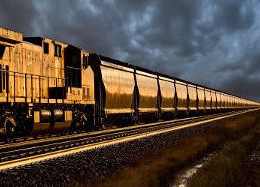Wrong Black Train
![]()

In 2003, country music singer Josh Turner released his debut album Long Black Train, which features his first hit song by the same name. Josh also wrote the title track, which puts on full display the rich baritone voice and soulful style that launched his career as a country music star.
More recently, in the spring of 2011, 17-year-old American Idol contestant Scotty McCreery performed "Long Black Train" in the Hollywood Round Final, and his rendition of the song sufficiently wowed the judges to earn him a spot in the Top 24. If you follow the show, you're probably aware that Scotty, who possesses a baritone voice reminiscent of Josh Turner's, went on to win the national singing contest later that summer.
As you might guess, the lyrics of the song revolve around the image of a long black train. Josh Turner, in commenting on the song in interviews, maintains that the train is a metaphor for the temptations that people face, and the song urges people to refrain from riding on that train, or resist succumbing to those various temptations, which are characterized as blatantly sinful lifestyles. Rather, the song assures us, we can find victory in the Lord.
The music video shows a train coming down the track, with a series of people standing in its path. We see these individuals apparently wrestling with the decision to either continue in a sinful lifestyle (and disappear in a puff of smoke as the train passes through them) or to refrain from that activity (and be "saved" by remaining unharmed as the train passes). Some of the characters on the track seem to represent people struggling with such things as alcoholism, unwed pregnancy, gambling, drug addiction, prostitution, and so on. Some of the characters are open to interpretation, but it's clear they are struggling with problems.
Before I get into the gist of what I want to say, I want to make one thing crystal clear—I love Josh Turner and his music. I am absolutely a fan. I love his songs, and "Long Black Train" is by far my favorite. Not only that, but based on what I have read about him, I have every reason to believe that he is a born-again Christian. I'd still be a fan if he weren't, but I'm just saying. I like the guy and wish him nothing but continued success. I wish the country music industry had a hundred more just like him.
I want to emphasize this up front because not one word of what I am going to say is meant as a criticism of Josh Turner or his song. So, don't waste your time bombarding me with thermonuclear comments accusing me of bashing Josh Turner. I'm not.
For God and country

It's common for mainstream country songs to make references to God, sin, salvation, or other things of a religious nature, even if those references are, well, not exactly of a religious nature ("Heaven's Just a Sin Away" by the Kendalls is one example that leaps to mind). This has always been true in country music, and should come as no surprise. Country music has always prided itself on giving voice to the thoughts and feelings of regular folks, most of whom tend to believe in God.
It is true that country songs that have religious references or overtones don't normally present a full-blown, biblically accurate gospel message. And really, why should they? After all, it's country music, not gospel. For that matter, even many gospel songs don't contain anything resembling a biblically sound presentation of the gospel, all too often breezing along with soothing, generic lyrics that can apply to almost anything. In other words, it's not as if I expected a country song to quote John 3:16 or croon about Christ's redemptive work on the cross.
"Long Black Train" falls into this category—it's a mainstream country song that has clear religious overtones, but without necessarily presenting a clear, biblically accurate formulation of the gospel of Jesus Christ. And I'm certainly not suggesting that there's anything inherently wrong with that. I greatly enjoy a lot of such songs, even though they don't present the gospel. They're just songs—songs about life, death, love, sorrow, hope, joy, dogs, trains, pick-up trucks, whatever.
In the United States, where many people have a passing familiarity with the Bible and the basic tenets of the Christian faith, songs that make reference to religious ideas without fully presenting the gospel message can still be effective in getting people to contemplate spiritual things—things they may have learned in church in their youth. Sometimes that's all it takes—a pointed reference to God or sin or salvation can often provoke thoughts of spiritual principles and biblical truths previously learned, although they are probably not expounded upon with any degree of detail or accuracy within the context of the song itself.
For example, in Hank Williams' classic country song "I Saw the Light," a sizable percentage of Americans understand that the protagonist of the song got saved—he repented of his sins and placed his faith in Jesus Christ as his Savior. Today, even if they've never done that and never will, a lot of Americans who hear that song still get it on some level, if for no other reason than these ideas are part of our culture as an ostensibly Christian nation. People don't necessarily need to have it spelled out for them in detail in the song.
People don't want
songs that preach to
them—that's what
preachers are for.
The bottom line is that I have no gripe whatsoever with songs that make reference to religious topics or have strong religious overtones, but don't fully and accurately present the message of the gospel: that we are all sinners and fall short of God's standard of holiness, that God's only Son Jesus died and rose again according to Scripture to pay the penalty for our sin and satisfy God's justice, and that it's up to us to believe that in faith in order to be born spiritually and have an eternal relationship with God.
Whew...I guess it would be tough to fit all that in a song. (I'm still trying to think of a word that rhymes with "holiness.")
After all, most people (including Christians) don't want songs that preach to them—that's what preachers are for. They want songs that make them think and feel. If songs make them think and feel about spiritual things, terrific.
A train by any other name...
So what is my gripe? My motivation in writing this article is not a desire to nitpick a great song to smithereens, nor is it to crucify a songwriter for failing to write lyrics that present the gospel in a manner that meets my approval. Seriously, I'm not that big of an insufferable jerk.
What motivated me to write this article is fear.
It makes absolutely no difference that Josh Turner interprets the train as temptation. He wrote it—he can interpret the train as anything he pleases. My fear is that multitudes of others interpret the train as something else:
Sin.
Of course, people can interpret the train any way they like. However, this strikes me as an obvious, straightforward way to interpret the image of the long black train in the song, and there is no doubt in my mind that many people do and will continue to interpret it that way.
(Wait for it...) S-o-o w-h-a-a-t?
"I know, I know. Temptation, sin, whatever. They're both bad...what's the big deal? OK, so avoid them both...what difference does it make?
Well, how about the difference between heaven and hell?
All aboard!

One of the most dangerous false teachings spreading throughout many major denominational churches and throughout society at large is the idea that God is nestled cozily within each and every person. Or divine energy. Or cosmic consciousness. Or Christ consciousness. Or whatever the trendy appellation du jour may be.
One of the problems with this view—besides the fact that it patently and demonstrably contradicts Scripture—is the fact that it makes it easier to objectify and externalize sin; that is, it makes it quite natural to see sin as something identifiable that's outside of us, something we can point at say:
"Ooh, don't do that...that's sin!"
If we hold this view, then sin naturally and logically becomes something we can avoid; something we can stay away from; something we can refrain from doing; something we can just say no to. And the next thing you know, sin has become something that, if we make the right choices and cultivate an adequate level of moral rectitude, we can steer clear of.
In other words (drum roll, please)...we can save ourselves—or at least earn boodles of brownie points with God that will surely swing things in our favor if we ever actually have to stand before Him.
Which we will:
11For it is written, "'As I live,' says the Lord, 'to me every knee will bow. Every tongue will confess to God.'"
12So then each one of us will give account of himself to God.
(Romans 14:11–12)
In the song "Long Black Train," the lyrics repeatedly admonish us not to ride that train. Don't even get on board, even though it's beautiful and its whistle sounds so alluring. It's natural to see the train as sin, and the characters in the video drive the point home: Don't go out and live a sinful lifestyle.

Don't be an alcoholic. Don't be a drug addict. Don't be a prostitute. Don't sleep around and end up as an unwed mother. Don't be a gambler (or a con artist...the guy with the cards is open to interpretation). But whatever he is—whatever any of them are—the message that gets hammered home again and again is simple: Don't go out and live a blatantly sinful lifestyle like these people. Don't ride that train.
My fear is that the message many people are getting from the song is that if you don't get on that train (of sin), you're OK. That is, as long as you refrain from living an overtly sinful lifestyle—as long as you don't make a conscious decision to get on that train and engage in sinful activity—you're safe.
"I'm a good person...I won't get on board that train. No sir, not me."
As we take this 'train' of thought to its logical conclusion, it's clear that if you can choose to not ride on that long black train (of sin), then obviously you must not currently be on board.
And there's the cockroach in the Kool-Aid. The truth according to God's Word is that unless you've been born again—unless you've put your faith in Jesus Christ—the last thing in the world you need to worry about is not getting on that train of sin. Why? Simple:
YOU'RE ALREADY ON IT!
Don't look now, but you've been riding on that train since you were a fertilized egg in your mother's womb. From God's point of view, sin isn't external—it's internal. In fact, it's about as internal as anything can possibly be. It's literally in our DNA:
5Behold, I was brought forth in iniquity. In sin my mother conceived me.
(Psalm 51:5)
That is, David is saying that he was sinful from the moment of conception (have fun wrangling over that one, Pro-Choicers). We are born with a sin nature, and we sin.
We're not sinners because we sin—we sin because we're sinners.
Theologians a whole lot smarter than me have written libraries full of books about this, but the fact that we are born with a sin nature basically boils down to the simple fact that we all have an overpowering, inborn tendency to do as we will, rather than as God wills.
We have all inherited a sin nature because we are all descendants of Adam, who sinned along with Eve by disobeying God. It has nothing whatsoever to do with how good or bad we are by human standards.
• Adolf Hitler had a sin nature...and so did Mother Teresa.
• Jack the Ripper had a sin nature...and so did Pope John Paul II.
• Serial killer Ted Bundy had a sin nature...and so did Buddha.
• You have a sin nature...and so do I. Trust me.
The only man ever born who didn't have a sin nature was Jesus—He wasn't a descendant of Adam. Jesus wasn't the son of an earthly father—He was the Son of a Heavenly Father.
He who knew no sin
I hope you'll indulge me for a moment, but you have to get this. I mean you need to have a stone-cold stranglehold on this one. This is so foundational that I want you to read it straight from God's Word with your own eyes.
While Jesus' mother Mary was betrothed to her husband-to-be Joseph, God sent the angel Gabriel to tell her that she would become pregnant before she ever consummated her marriage with Joseph, and would have a son. Initially, Mary was a bit incredulous, as you can imagine:
34Mary said to the angel, "How can this be, seeing I am a virgin?" 35The angel answered her, "The Holy Spirit will come on you, and the power of the Most High will overshadow you. Therefore also the holy one who is born from you will be called the Son of God.
(Luke 1:34–35)
Although this must have been a shocker, Mary obediently submitted to the word of the Lord. After she became pregnant, however, Joseph wanted to deal with the situation as quietly and as discreetly as possible, which was perfectly understandable. Joseph was a godly man, but he probably wasn't sure what to make of all this. At the very least, he didn't want to see Mary subjected to any more public humiliation than absolutely necessary.
I mean, here's a guy with a pregnant fiancée. Today nobody would bat an eye...but in ancient Judea? This was a fate worse than death. You have to figure Joseph wasn't having an easy time dealing with the situation:
19Joseph, her husband, being a righteous man, and not willing to make her a public example, intended to put her away secretly. 20But when he thought about these things, behold, an angel of the Lord appeared to him in a dream, saying, "Joseph, son of David, don't be afraid to take to yourself Mary, your wife, for that which is conceived in her is of the Holy Spirit. 21She shall bring forth a son. You shall call his name Jesus, for it is he who shall save his people from their sins."
(Matthew 1:19–21)
Jesus' virgin birth through the Spirit of God is absolutely essential to God's plan of redemption. It's what made it possible for Jesus—although tempted in every way—to remain sinless, which is what qualified Jesus to pay the penalty for our sins. Otherwise, He would have had to die for His own sins. By being sinless, He was qualified to take our punishment—the just for the unjust—so that we could be redeemed from the penalty of sin.
There are people who vehemently attack Jesus' virgin birth, insisting that it's a fable and that Jesus was merely a great moral teacher (right up there with Buddha, Muhammed, and all the rest) who set a noble example for us to follow—but was merely an ordinary man no different from you or me.
Assuming, of course, that He existed at all.
But if that's all He was, then we are all in very deep trouble, because we are all guilty of sin and that sin has separated us from God. As a result, we all fall short of God's holiness, and so cannot live in His presence. The virgin birth of Jesus via the Holy Spirit (that is, the fact that He is the Son of God—God manifest in the flesh), is of the utmost importance because:
With it, we can have Christ's perfect righteousness imputed to us by faith.
Without it, we must rely on our own righteousness ("filthy rags").
With it, we can be forgiven of our sins because Jesus took our punishment.
Without it, we alone will pay the penalty for our own sin.
With it, we can be assured of eternal life in God's presence.
Without it, we are all doomed to eternal separation from God's presence.
And just to be clear, these last two would be heaven and hell, respectively.
"This train is bound for glory..."
The point is that if you interpret the long black train as sin, then it's the height of absurdity for someone to tell you not to ride it—the only thing you need to be told is...
GET OFF IT!

But you can't hop off by yourself—it's going too fast. You're not just on it, you're stuck on it. There is only one person who can get you off that train, and His name is Jesus.
The moment you put your faith in Christ's death and resurrection for the forgiveness of your sin, He snatches you off that train—a train that's speeding toward an eternity of separation from God. And He'll never let go.
Unfortunately, many people simply won't do that. They refuse to believe there is a loving God that created them, and that they are spiritually separated from Him by their sin. They refuse to have a change of heart about the fact that they are sinners in need of a Savior, and are untroubled by the fact that Jesus died to pay the penalty for their sin. In many cases, it is their intellectual arrogance and self-righteous pride that cause them to spurn God's mercy and grace.
And not to stray too far off point, but judging by the way the pieces of the prophetic end-time scenario are coming together, there may be less time than many believe to take advantage of that mercy and grace.
Instead, people insist on finding any way they can to justify themselves in their own minds. They grasp at any man-made religious or philosophical ideas that promise to make them feel better about themselves and about spiritual things in general, and they will flock to deluded false teachers and wolves in sheep's clothing who tell them sweet, comforting lies that assure them there is no need to do any of the above.
When people interpret the long black train in this song as sin, it makes it easier for them to walk away feeling justified. No need for repentance; no need for forgiveness; no need for redemption.
"It's all good...I'll just stay away from that long black train."
As I said earlier, I don't mean this to sound like a criticism of Josh Turner or his music. I still like the song. It's a great song, and there's still a positive, moral message that you can take away from it. Yes, avoid blatant sin. Yes, resist the temptation to indulge in sin. Yes, there's victory in the Lord...there is victory in no other. Yes, cling to the Father...by all means.
But listen to me. If you're feeling all warm and cozy about yourself and about your eternal destiny because you think you're successfully avoiding that long black train of sin by your own good deeds and moral behavior, then you are deceiving yourself. Or if you think you've found a path to God that just feels so much more "spiritual" than that corny old Bible stuff about repenting and having faith in Jesus and obeying God's Word, same deal: You are deceiving yourself. It's that simple.
25There is a way which seems right to a man, but in the end it leads to death.
(Proverbs 16:25)
In reality, you've been on that long black train of sin your entire life, and you need to get off it while there's still time. It's the wrong black train, and its destination is a place I wouldn't wish on my worst enemy.
But there is another train. Its final destination is heaven and a ticket to ride is absolutely free—at least it won't cost you anything.
It cost God the life of His only Son.
It costs you nothing—just faith.
That, and maybe a dash of self-righteous pride.
Greg Lauer — JUN '12
![]()
If you like this article, share it with someone!
1. Adapted from Sunset Over Grass Field © AOosthuizen at Can Stock Photo
2. Train at Sunset © bobloblaw66 at Can Stock Photo
3. Flag Rope Hat © sharpner at Depositphotos
4. Chakra Meditation © Nikki24 at Fotosearch
5. Streetwalkers © Klementiev at Can Stock Photo
6. Train at Night © PeterAlbrektse at Can Stock Photo
Scripture Quotations:
All Scripture is taken from the World English Bible, unless specifically annotated as the King James Version (KJV) or the American King James Version (AKJV).
